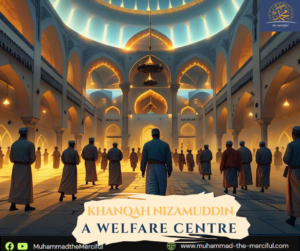Lives of saints(Auliya) are role models for relieving the distressed and depressed people.
Heeding the Propheticﷺ instructions and intent, the Auliya reach out to the people who are beset with harsh conditions irrespective of their creed, caste or ethnicity.
The Qur’an affirms that spending in charity on the welfare of people is the conduct of the believers who surrender themselves to the will of Allah, However, infidels heap scorn on the lowly and the weak. Rejecting philanthropic work is one of their attributes. Almighty Allah mentions in the Holy Quran:وَإِذَا قِيلَ لَهُمْ أَنفِقُوا مِمَّا رَزَقَكُمُ اللَّهُ قَالَ الَّذِينَ كَفَرُوا الَّذِينَ ءَامَنوا الطعِمُ مَن لَّوْ يَشَاءُ اللَّهُ أَطْعَمَهُAnd when it is said to them: “Spend (in the way of Allah) of what Allah has given you,” the disbelievers say to the believers: “Shall we feed that (poor) man whom, if Allah so willed, He would feed (Himself)?“[Qur’an 36 Surah Yasin :Verse 47]
The above verse signifies that the well-off who are disdained by the very notion of feeding, sheltering and caring for the needy in society reveal a heathen streak in their character, though they profess Islam. On the contrary, the ardent faithful never stop dispensing generosity to the hunger-stricken.
In the estimation of Imam al-Razī, the innermost purpose of worshipping the Divine is twofold: the observance of the divine ordinances and the development of tender feelings for human beings.
He based his argument on the following verse:
وَمَا خَلَقْتُ الْجِنَّ وَالْإِنسَ إِلَّا لِيَعْبُدُونِAnd I created the jinn and human beings solely to adopt My servitude.[Surah Ad-Dhariyat Ch.51: Verse 56]
The celebrated Imam, providing an exegesis of the words of Allah, comments, For what forms of service did Allah create the jinns and the humans? To us that service is revering the Divine ordinances and showing compassion to Allah’s creatures.
In the following article the conduct of Muslim saints and the performance of their khanqahs with regard to taking care of people unable to help themselves fully or earn a decent living for subsistence is mentioned. In their lifetime, these mystics dedicated themselves to the cause of the needy and, therefore, their public-spirited acts did not terminate with their departure from this world. Their tombs are sources of spiritual and religious direction for the seekers after the truth, but they also serve as centres of material help and alleviation of hunger.

SHAYKH NIZĀM AL-DĪN AWLIYA’S SELFLESS HELP TO THE NEEDY
The guest house(Khanqah) of Shaykh Nizām al-Dīn Awliya'(RA) served as a welfare centre for the entire locality. It helped and supported numerous groups living in the neighbourhood. One day some houses in Ghiyathpur caught fire. It was a summer day. The shaykh rushed to the roof of his house barefoot and stood there till the fire was completely extinguished. He then deputed Iqbal to count the houses that had been burnt. He sent to every house two silver coins, two trays of food, and one pitcher of cold water. In those days two silver coins sufficed for buying all the essentials for a household.

THE POOR OLD WOMAN WHO FETCHED WATER FROM WELL
Another day the shaykh saw an old woman drawing water from a well near the river Jamuna. He stopped and inquired from the woman: “Since the Jamuna(river) is so near, why do you take the trouble of drawing water from this well?” The woman replied: “I have an old, destitute husband. We have nothing to eat. The water of the Jamuna is very tasty and induces hunger. Because it quickens our appetite, I do not take water from the river.” The shaykh was deeply shaken at this explanation. Returning to the hospice(Khanqah), he summoned Iqbal and said: “Lällä! In our Ghiyathpur there is a woman so poverty-stricken that she does not drink Jamuna water for fear of getting hungry. Go to her house, find out her daily needs, and every month without fail give her that amount.”

On another occasion, hearing about an imminent Mongol invasion, large numbers of people from adjacent areas flocked to the khanqah of Shaykh Nizām al-Din. They sought refuge within its walls, and the shaykh did not disappoint them. He provided both food and shelter to these people. At the same time, disciples who had come to see him from distant places were asked to shorten their stay in the khanqah and to return home.
Based on book :- Hearken to the call of Duty (The Philanthropic Approach of Sufi masters in Islam) by Sahibzada Dr. Hussain Mohiuddin Qadri


